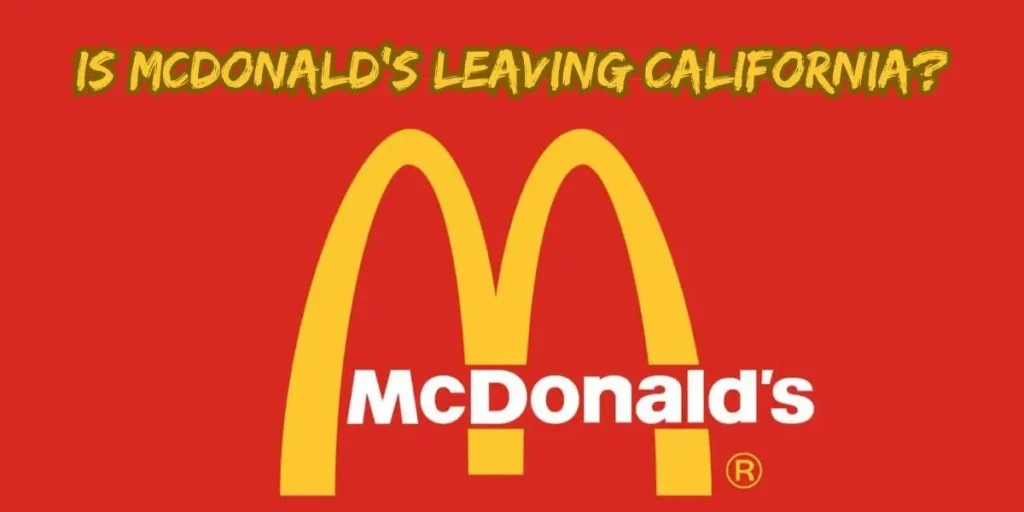In recent times, there’s been a buzz around the topic of McDonald’s leaving California. This potential move by the fast-food giant has sparked conversations across various platforms, with many pondering the reasons behind such a decision and its possible repercussions. Let’s delve into the implications of McDonald’s leaving California, and what it could mean for both the company and the state.
The Background
McDonald’s has been a staple in California for decades. With its roots deeply embedded in the state’s culture and economy, the idea of McDonald’s leaving California seems almost unfathomable. However, economic factors, regulatory challenges, and market dynamics might be pushing the corporation to reconsider its operations in the Golden State.
Economic Considerations
One of the primary reasons speculated for McDonald’s leaving California is the state’s high operating costs. California is known for its stringent regulations, high minimum wage, and substantial tax burdens. For a company like McDonald’s, which operates on thin margins, these costs can significantly impact profitability. By leaving California, McDonald’s could potentially reduce its operational expenses and improve its bottom line.
Regulatory Challenges
California’s regulatory environment is another critical factor that might be influencing McDonald’s decision. The state has some of the strictest labor and environmental regulations in the country. Compliance with these regulations can be both costly and complex. If McDonald’s leaving California becomes a reality, it would reflect broader challenges businesses face in the state.
Market Dynamics
The fast-food market in California is highly competitive. With a plethora of local and national chains vying for consumers’ attention, maintaining a strong market presence requires constant innovation and substantial marketing investments. McDonald’s leaving California could be a strategic move to reallocate resources to markets with higher growth potential and less competition.
Impact on Employment
One of the most significant concerns regarding McDonald’s leaving California is the potential impact on employment. McDonald’s is a major employer in the state, providing jobs to thousands of individuals. If McDonald’s were to exit California, it could lead to job losses and economic disruption in communities that rely on the company for employment opportunities.
Franchisees and Suppliers
Another group that would be affected by McDonald’s leaving California are the franchisees and suppliers. Franchisees, who have invested significant resources into their businesses, would face substantial financial losses. Similarly, suppliers who provide goods and services to McDonald’s would see a decline in business, impacting their revenue and operations.
Consumer Impact
From a consumer perspective, McDonald’s leaving California would alter the fast-food landscape. McDonald’s has a loyal customer base in the state, and its departure would leave a void in the market. Consumers would have to turn to other fast-food options, which might not offer the same convenience, taste, or affordability that McDonald’s is known for.
Real Estate and Infrastructure
McDonald’s leaving California would also have implications for the real estate market. The company owns and leases a significant amount of commercial real estate in the state. The sudden availability of these properties could lead to shifts in the commercial real estate market, impacting property values and rental rates.
Environmental Considerations
Interestingly, McDonald’s leaving California could have some environmental benefits. The company’s operations involve significant waste production and resource consumption. A reduction in McDonald’s footprint in the state could lead to a decrease in waste and energy consumption, aligning with California’s environmental goals.
Strategic Repositioning
From a strategic standpoint, McDonald’s leaving California could be seen as a repositioning effort. By exiting a market with high costs and regulatory challenges, McDonald’s can focus on regions with more favorable business climates. This move could be part of a broader strategy to streamline operations and enhance profitability.
Potential for Return
While the idea of McDonald’s leaving California might seem definitive, there’s always the possibility of a return. Market conditions and regulatory environments are constantly evolving. If California’s business climate becomes more favorable in the future, McDonald’s might consider re-entering the market. The company has the flexibility and resources to adapt to changing conditions and seize new opportunities.
The Broader Business Landscape
McDonald’s leaving California could also have ripple effects on the broader business landscape. It might prompt other companies facing similar challenges to reconsider their operations in the state. Such a trend could lead to a reevaluation of California’s regulatory and economic policies, as the state seeks to retain and attract businesses.
Conclusion
The prospect of McDonald’s leaving California is a multifaceted issue with wide-ranging implications. From economic and regulatory challenges to impacts on employment and the environment, the potential exit of this fast-food giant could reshape various aspects of the state’s landscape. While the idea of McDonald’s leaving California might seem daunting, it also opens up discussions about how businesses and policymakers can work together to create a more conducive environment for growth and innovation.
In conclusion, McDonald’s leaving California is not just about a fast-food chain moving out of a state. It’s about understanding the intricate dynamics that drive business decisions and the ripple effects they create. Whether or not McDonald’s ultimately decides to leave California, this conversation highlights the need for continuous dialogue and adaptation in an ever-changing economic landscape.
Read Also: mughal delhi una visita

